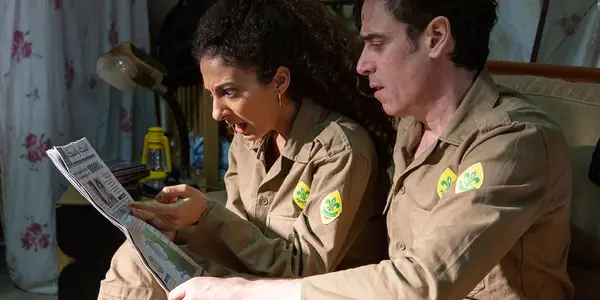From the decades of darkness endured by Occupied Palestine, there’s something inspiring about being able to celebrate one’s cultural heritage, identity and iconography within an apocalyptic framework. The result is British-Palestinian filmmaker Basil Khalil‘s A Gaza Weekend; a timely parable that extends an open invitation to empathise with the “other”.
Based on an idea that predated Covid-19, Israel has been ravaged by the ARS virus, and everyone wants out of Dodge. Keren (Mouna Hawa), an Israeli, and her English partner, Michael (Stephen Mangan), are denied the right to leave, and must escape to the Gaza Strip (a safe place) to flee to Europe. Through one of their journalist contacts, they find themselves in the hands of two enterprising yet incompetent Palestinian tradesmen, Waleed (Adam Bakri) and Emad (Loai Nofi), who fail to conceal the operation from the ruling Hamas authorities. Waleed hides the couple in his home, and, amidst growing tensions with his more pragmatic wife Nuhad (Maria Zreik), tries to figure out a solution for their job and survival, as the media is alerted of the couple’s presence in the territory, and a manhunt ensues.

Khalil‘s sense of humour mixes the absurd with the dark, crafting a fantastical tale which confronts the turmoil his people continue to face, without being entirely about them. Not to imply that this could not ever happen (anyone can be an outcast), but with the world’s lack of action in aiding or liberating the oppressed citizens of Occupied Palestine, it seems more accessible to showcase their struggles through a cypher (ironic as it may seem).
Without going full-on World War Z, A Gaza Weekend feels large in scope, yet economic as a production. Themes of fear, paranoia and surveillance are amplified in favour of excessive action-based set-pieces that would be more at home in Hollywood. We sense that Keren and Michael, frustrated as they are, never suffered anything remotely dangerous like our Palestinian protagonists. Yet, the film is thoughtful enough to ensure everyone is relatable, illuminating everyone’s struggles, however (relatively) privileged they appear to be.
In Waleed’s case, for example, not only is he an atrocious businessman (to the point where he’d trade Nuhad’s jewellery for the promise of enterprise), but he’s constantly envious of certain individual’s powerful status in the Hamas authority (much like the IDF), whom he knew in childhood. It’s not about him not being authoritative, but more about having a dignified place in society. Oh, and the fact that his country is still under occupation does hinder his long-term success.
The writing balances pathos with quirkiness, and our cast of characters are allowed to showcase their individual flaws and struggles, with the promise of growth. Ultimately, what Khalil understands is that the complexities of the human condition transcend any ideology or god-given right to ownership and authority. It’s about the right to exist…and to be free.
Humanist as it is, the farcical elements brighten up the otherwise angry narrative (referencing Ernst Lubitsch‘s To Be or Not to Be). With nods to the Israeli family dynamics, Khalil isn’t afraid to touch on Palestinian characters’ eccentricities and nuances, bringing out the cultural oddities of interpersonal relations between man, his mother and his spouse. Khalil places a strong emphasis on female individuality and intellect as Nuhad demonstrates to her often unfocused husband what the key to a successful strategy could be, despite the male-dominated setting of the picture.
With all the tension building throughout the proceedings, the film introduces a good deal of levity (even slapstick) to calm the mood, utilising the impeccable instincts of the actors in question.
This isn’t mere fantasy. This is hope that someday the Palestinian people will find hope and prosperity on their own terms. The occupiers in question are meant to be posed with the question, “How does it feel?”
A reasonable cineaste would know that A Gaza Weekend won’t change the world’s views overnight, yet its charm and ability to instil emotional engagement for all involved is a marvellous feat you can’t put a price on. It’s optimistic, yet everyone’s equally susceptible to ridicule.
Watch A Gaza Weekend
Does content like this matter to you?
Become a Member and support film journalism. Unlock access to all of Film Inquiry`s great articles. Join a community of like-minded readers who are passionate about cinema - get access to our private members Network, give back to independent filmmakers, and more.